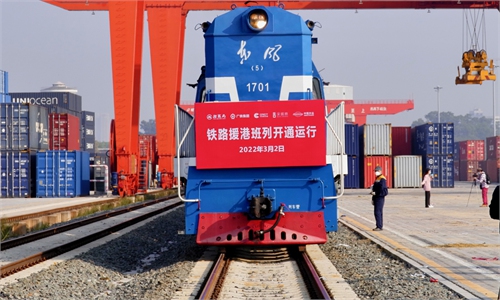Auto dealerships defy predictions
Online shopping beats traditional vehicle sellers

Photo:VCG
US auto dealers, flush with cash, are buying each other at a record pace, but they are not closing stores in the process.
Defying predictions that the internet and Tesla Inc's direct-to-consumer sales strategy would kill traditional auto dealerships, acquisitions in the sector hit a record $8 billion in value last year, according to data from Kerrigan Advisors, a company that tracks transactions among largely private auto dealer groups. That is more than triple the $2.5 billion for 2020.
Most of the buyers were large public or private auto retail chains, such as Asbury Automotive Group Inc and Lithia Motors Inc. Many of the sellers were smaller, family-controlled operations, said Erin Kerrigan, founder of Kerrigan Advisors.
"We had 338 unique transactions in the industry," Kerrigan said. "The prior peak was 288 in 2020." Publicly traded dealer groups bought over 250 dealerships last year, she said.
Despite the activity, the number of stores that car buyers could visit has remained stable for the past decade, according to a survey by Urban Science, a consultancy.
As of July 1, 2021, Urban Science counted 18,157 dealerships, or "rooftops," in the US, up 46 stores from six months earlier. In 98 percent of local markets in the US, Urban Science found no net change in the number of auto dealerships.
In short, ownership has consolidated, but the US auto retail infrastructure has not.
"As far as the public goes, it looks like the same number of dealers are out there," said Urban Science Global Director of Data Mitch Phillips.
For consumers, the consolidation of auto dealer ownership could be largely invisible in the short term. But in the longer term, industry executives say larger dealer groups will be better equipped to deploy technology to enable faster online shopping and financing, allow customers to select from a wider array of vehicles at multiple stores and get repairs done more conveniently.
Car dealers from across the US will gather in Las Vegas starting on March 10 for the annual convention of the National Auto Dealers Association. Those who hit the Strip will do so after one of the most profitable years ever for the auto retailing sector.
Auto dealers have thrived during the pandemic, despite challenges from technology-driven disruptors such as online used car retailer Carvana Co. Unlike department stores battered by Amazon.com Inc, new-vehicle dealers enjoy unusually strong protection from state franchise laws that block auto manufacturers from selling around them, directly to consumers.
However, more customers are doing at least some shopping online, and dealers stand to lose revenue generated by recall and warranty repairs as more fixes are done with software updates.
Different bets
Buyers and sellers are making different bets about the future for brick-and-mortar dealerships.
Sellers tend to be family-run businesses faced with making substantial investments in new equipment and technology to sell and service electric vehicles. They are concerned that automakers want to squeeze dealer profit margins to recover the enormous investments they have made in electrification, said George Karolis, president of the Presidio Group, a dealership transaction adviser.
"They face large investments to keep up with the digitization of the business," Karolis said. With profits high and valuations for dealerships strong, smaller owners are deciding now is the right time to exit, he said.
Buyers -- especially public chains such as AutoNation or Sonic Automotive -- are using cheap capital and cash generated during the pandemic to get bigger, banking on economies of scale to overcome the challenges that drove sellers to the table.
With its size, Lithia can borrow money at lower interest cost, and get products and services from vendors at 20-30 percent lower cost than smaller dealers, Chief Executive Bryan DeBoer said.
Lithia also can as much as double an acquired store's used car business by reconditioning and selling vehicles more than five years old and use its own brand of replacement parts to keep customers from going elsewhere for service, he said.
Whether the franchise model survives depends on how dealers adapt, said Asbury Automotive Chief Executive David Hult. Asbury launched two of the biggest deals in the current merger and acquisition (M&A) boom, acquiring Park Place Dealerships for $735 million and spending $3.2 billion last year for the Larry H. Miller Group, then the eighth-largest US auto retail group.
Asbury needs larger scale as it invests in online sales technology, develops systems that will allow service customers to track their vehicle through the repair process and considers revamping sales and service facilities, Hult said.
Electric world
"If you know the world is going to be electric ... you don't need stores to be as big as they are. Maybe a small showroom ... and smaller service centers" in more locations, he said. "You'll have fewer owners, owning more stores."
Lithia's DeBoer said he would welcome a move to an "agency model" where dealers are paid set amounts for handling a vehicle sale, haggling over price is eliminated and dealers are not expected to stock large numbers of vehicles.
"A lot of our SG&A costs are negotiation costs," he said. "We could be a lot more productive."
Auto retail executives say consumers shopping online still want places to see vehicles and get them repaired.
"If you have a footprint in a market, you don't have a plan of closing" stores, said AutoNation Executive Vice President Marc Cannon. "Our plan is to develop them out and maximize them."
AutoNation on February 23 said it had raised $700 million through a debt sale that could be used for acquisitions, among other purposes.
"We have an active interest in M&A," said AutoNation Chief Executive Mike Manley.
Reuters

